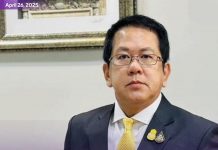
The United Nations Office on Drugs and Crime (UNODC) has indicated its interest in working more closely with Thailand to combat narcotics in the region.
From March 3 to April 1, the UNODC Southeast Asia and Pacific Regional Office, the Thai Ministry of Foreign Affairs, the Office of Narcotics Control Board (ONCB) and the Mae Fah Luang Foundation co-organized a trip to the Golden Triangle region near Chiang Rai province to review the drug situation in Thailand and the Mekong subregion.
Among the efforts observed by the group was a royal initiative as part of the Doi Tung Development project, which has for decades been transforming opium plantations into fertile land for highland crops such as cold-climate plants and vegetables, thereby assisting hill tribe people who rely on agriculture.
Ghada Waly, the first woman to lead the UNODC and in the position since February 2020, stated during the trip that transnational drug trafficking groups and drug addiction were among the most pressing regional issues that needed to be addressed.
According to Waly, one of the most important missions during this trip was the announcement of UNODC’s Regional Program for Southeast Asia and the Pacific. By focusing on threats such as synthetic drugs and trafficking, the program was designed to support tailored responses to organized crime, terrorism, corruption and drugs in the region.
HRH Princess Bajrakitiyabha Narendiradebyavati has also granted the UNODC executive director an audience to discuss the issue.
According to Waly, the princess was instrumental in the establishment of the UN Standards on the Treatment of Women Prisoners, also known as the “Bangkok Rules,” in recognition of Thailand’s critical role in their development and adoption at the UN General Assembly.
For several years, the UNODC has collaborated on sustainable, alternative development projects with the Mae Fah Luang Foundation under Royal Patronage. The foundation has been a strong advocate for assisting former opium-growing communities in transitioning to more sustainable agricultural practices.
The UNODC was also eager to assist Thailand in combating drug trafficking across borders with the establishment of the International Narcotics Control College (INCC). The INCC will focus on research and knowledge transfer for students throughout the Mekong subregion, as well as setting up a narcotic crop research center. (NNT)
 |
 |
 |





